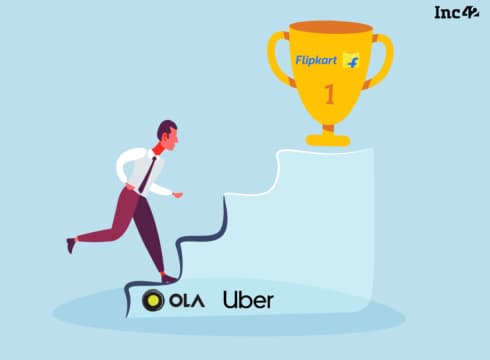The Fairwork Project, part of the Oxford Internet Institute, piloted the ranking system in India recently
The study was focussed around 12 major Indian internet companies
Ola, Uber, and Foodpanda (acquired by Ola) scored the lowest in the rankings
Inc42 Daily Brief
Stay Ahead With Daily News & Analysis on India’s Tech & Startup Economy
“Ambur Iyyappa, the startup’s first full-time employee, had lost his job as a delivery boy with a courier company when he joined Flipkart in 2009. This ‘human ERP’ went on to script extraordinary innings, using his innate talent for organisation to create what became the backbone of Flipkart’s first order management system.”
Could it have been Flipkart’s work culture that inspired Iyyappa to go the extra mile? It certainly is one of the reasons for Flipkart scoring top marks on Fairwork’s first rating system for working conditions in India’s digital economy. The Fairwork Project, part of the Oxford Internet Institute, piloted the ranking system in India and South Africa, with the ratings were released on March 25.
In India, the Fairwork study was focussed around 12 major internet companies including Flipkart, Dunzo, Bigbasket, Zomato, Swiggy, UrbanClap, Housejoy, Rapido, UberEats, Uber, Ola and Foodpanda.
Here, an Indian startup was ranked on the basis of five parameters.
Ola, Uber, Foodpanda Bring Up The Bottom
Cab aggregators Ola and Uber, as well as, food delivery platform Foodpanda (acquired by Ola) scored the lowest in the Fairwork rankings.
A 2017 Factor Daily article revealed that long working hours and limited work-life balance at Ola have been the primary factors behind the high attrition rates at the company. The cut-throat competition between both Ola and Uber also seem to have taken a heavy toll at the work cultures of both the companies.
This is evident from the fact that while Uber scored just 2 points in India, it was able to score 5 points in South Africa, for the similar Fairwork ranking methodology.
As for Foodpanda, it’s delivery boys has earlier reported to the media about salary non-payment, low incentives, and lack of transparency. Protests in this context were held in Mumbai, Pune, Hyderabad, Bengaluru, Chennai and Kolkata. So once again, it’s not surprising that it didn’t score well in the rankings.
Key Takeaways From The Fairwork Rating System
- None of the companies scored on having a registered body to undertake collective representation/bargaining for workers
- All companies follow a fair pay system for the workers.
- Only three Indian companies—Flipkart, Zomato, and Swiggy—received points for providing freedom of association and voicing concerns of the workers
- Only Dunzo was able to meet the condition for clear terms and conditions for the workers
- Only Flipkart provides evidence of equity and/or informed consent for data collection
- Only criterion that Ola, Foodpanda, and Uber met was fair pay, where the workers are paid at least the local minimum wage.
Workforce Challenges In A Gig Economy
Being a developing nation, the minimum wage in India is already on the downside. According to the Minimum Wages Act, 1948 (with revised amendments in 2017), National Floor Level Minimum Wage has been revised to INR 176 per day. This is quite low as compared to other G-20 nations such as China (17.5 RMB or INR 179.3 per hour), France (1498.47 Euro or INR 115644.43 per hour), among others.
With India leaping ahead as a startup nation, the gig economy is on the rise. In India, 70% of corporates have used gig workers at least once for major organisational issues in 2018.. With this, while opportunities have been increased, so have the risks and the challenges.
While the gig economy supports independent work and a flexible environment, it also robs the employees of traditional perks enjoyed by employees in a more stable environment, such as pension, provident funds, gratuity or parental leave. At the same time, the risk to find the right employee at the right time increases for the employers, which explains the higher reliance on gig workers.
Surveys such as the Fairwork Project will help an Indian startup assess its current employability conditions and compare them to global standards. For instance, within the same parameters, there was no company in South Africa which scored less than 5, which should be the case for many established Indian startups too.
This clearly suggests a long road for the Indian internet companies in terms of creating a safe, healthy and transparent work culture. With top companies scoring poorly on this scale, a lot of work is needed for Indian startups to up their game.
{{#name}}{{name}}{{/name}}{{^name}}-{{/name}}
{{#description}}{{description}}...{{/description}}{{^description}}-{{/description}}
Note: We at Inc42 take our ethics very seriously. More information about it can be found here.


